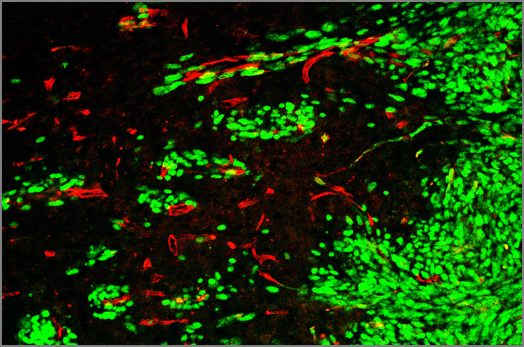Tumour Research and Immunology
- Short Description
-
In Germany, 500,000 new patients are diagnosed with cancer every year. Malignant tumours are genetic diseases; the majority of the mutations responsible are acquired in the course of a lifetime. However, these mutations are not only caused by environmental influences, hereditary factors and lifestyle, but chronic inflammation also contributes to genetic instability. During transformation of normal cells into cancer cells as well as the development of therapy resistance, tumour-inducing mutations collaborate with epigenetic mechanisms. This process is influenced by the tumor microenviroment, i.e. the interplay between tumor cells and inflammatory and stromal cells and certain tumor physiological parameters such as hypoxia and altered metabolism. One important task of immune cells is to eliminate malignant transformed cells. In the Campus Profile Area “Tumour Research and Immunology”, scientists are investigating the interaction between tumour cells, inflammatory cells and tumour stromal cells in order to gain knowledge that will help them to develop new cancer therapy strategies. Another research field of the Profile Area is application-oriented and aims at improving common methods of treatment such as chemo- and radiotherapy.
- Successful Joint Research
-
- LOEWE Research Cluster ADMIT – Advanced Medical Physics in Imaging and Therapy
Funding Period: 2024 to 2027 - German Cancer Aid EuroNet-PHL-C2 Study
Funding period: 2016 to 2026 - Nuclear safety research and radiation research, BMBF: PARTITUR: Biological and physical optimization of particle beams - radiation protection for patients (with the participation of the GSI Helmholtzzentrum für Schwerionenforschung, dem Universitätsklinikum Gießen & Marburg and the Universitätsklinikum Hamburg-Eppendorf)
Funding period: 2022 to 2025 - DFG Research Training Group 2573: The inflammatory tumor secretome – from understanding to novel therapies
Funding period: 2020 to 2025 - LOEWE Research Cluster iCANx: Cancer – Lung (Disease) Crosstalk: Tumor and Organ Microenvironment (in cooperation with Max Planck Institute for Heart and Lung Research Bad Nauheim)
Funding period: 2021 bis 2024 - DFG Clinical Research Unit KFO 325: Clinical relevance of tumor-microenvironment interactions in pancreatic cancer
Funding period: 2018 to 2024 - DFG International Research Training Group IRTG 1871 Molecular Pathogenesis of Male Reproductive Disorders
Funding period: 2013 to 2022 - DFG Collaborative Research Centre CRC/Transregio 81: Chromatin Changes in Differentiation and Malignancies
Funding period: 2010 to 2018 - LOEWE Industrial Collaborative Project Patienten-individuelle in-vivo Online-Dosimetrie in der Strahlentherapie (PION-Dos)
Funding period: 2015 to 2017 - LOEWE Industrial Collaborative Project Dermale Immuntherapie mit Arthropodenallergenen (DItA)
Funding period: 2015 to 2017 - DFG Clinical Research Unit KFO 210: Genetics of Drug Resistance in Cancer
Funding period: 2008 to 2016 - DFG Collaborative Research Centre CRC/Transregio 17: Ras-dependent Pathways in Human Cancer
Funding period: 2004 to 2013 - LOEWE Research Cluster Tumours and Inflammation
Funding period: 2008 to 2012
- LOEWE Research Cluster ADMIT – Advanced Medical Physics in Imaging and Therapy
- Research Infrastructure
-
At Justus Liebig University Giessen:
- Biomedical Research Center Seltersberg (BFS)
- Science Unit for Basic and Clinical Medicine (ForMED)
- Medical Science Tower (Science Tower)
At Philipps-Universität Marburg:
- Research Environment
- Participating Researchers
-
At Justus Liebig University Giessen
- Prof. Dr. med. Till Acker, Institute for Neuropathology
- Dr. Daniel Amsel, Junior Research Group Leader AI-RON "AI-assisted morphomolecular precision medicine in neurooncology"
- Prof. Dr. Kai-Th. Brinkmann, Faculty of Mathematics and Computer Science, Physics, Geography, Department 07, II. Physics Institute
- Prof. Dr. Reinhard Dammann, Institute for Genetics, Department 08
- Prof. Dr. Stefan Gattenlöhner, Prof. Dr. Andreas Bräuninger, Institute for Pathology
- Prof. Dr. Dr. Friedrich Grimminger, Prof. Dr. Mathias Rummel, Prof. Dr. Andre Menke, Prof. Dr. Klaudia Giehl, Dr. Rajkumar Savai, Internal Medicine, Medical Clinic IV and V
- Prof. Dr. Dieter Körholz, Prof. Dr. Christine Mauz-Körholz, Department of Paediatric Haematology and Oncology
- Prof. Dr. Peter Klußmann, Clinic for Ear, Nose and Throat Medicine
- Prof. Dr. Elke Roeb, Centre for Internal Medicine, Medical Clinic II, Gastroenterology
- Prof. Dr. Lienhard Schmitz, Prof. Dr. Tilman Borggrefe, Institute for Biochemistry
- Prof. Dr. Eberhard Uhl, Clinic for Neurosurgery, Neurooncology
- Prof. Dr. Florian Wagenlehner, Clinic und Policlinic for Urology, Children’s urology and Andrology
At Philipps-Universität Marburg
- Prof. Dr. Detlef Bartsch, Visceral, Thoracic and Vascular Surgery
- Prof. Dr. Stefan Bauer, Institute of Immunology
- Prof. Dr. Uta Bauer, Institute for Molecular Biology and Tumour Research
- Prof. Dr. Alexander Brehm, Prof. Dr. Guntram Suske, Biomedical Research Centre
- Prof. Dr. Rita Engenhart-Cabillic, Clinic for Radiation Therapy
- Prof. Dr. Thomas Gress, Clinic for Gastroenterology
- Dr. Matthias Lauth, Institute for Molecular Biology and Tumour Research
- Prof. Dr. Ulrich Steinhoff, Prof. Dr. Magdalena Huber, PD Dr. Alexander Visekruna, Institute for Medical Microbiology and Hospital Hygiene
- Prof. Dr. med. Andreas H. Mahnken MBA, MME, EBIR, Clinic for Diagnostic and Interventional Radiology
- Prof. Dr. Rolf Müller, Institute for Molecular Biology and Tumour Research
- Prof. Dr. Andreas Neubauer, Prof. Dr. Andreas Burchert, Prof. Dr. Elke Pogge von Strandmann, PD Dr. Cornelia Brendel, Clinic for Haematology, Oncology, Immunology
- Prof. Dr. Axel Pagenstecher, Clinic for Neuropathology
- Prof. Dr. Thorsten Stiewe, Institute for Molecular Oncology
- PD Dr. Ulrike Theiß, Clinic for Radiation Therapy
- Prof. Dr. Uwe Wagner, Clinic for Gynaecology
At Technische Hochschule Mittelhessen University of Applied Sciences- Dr. Kilian-Simon Baumann; Faculty of Life Science Engineering
- Prof. Dr. Martin Fiebich; Faculty of Life Science Engineering
- Prof. Dr. Boris Keil; Faculty of Life Science Engineering
- Prof. Dr. Frank Runkel; Faculty of Life Science Engineering
- Prof. Dr. rer. nat. Klemens Zink; Faculty of Life Science Engineering
- Contact person
-
Justus Liebig University Giessen
Prof. Dr. Till Acker
Institute of Neuropathology
Arndtstraße 16
35392 Gießen
Philipps-Universität Marburg
NN


